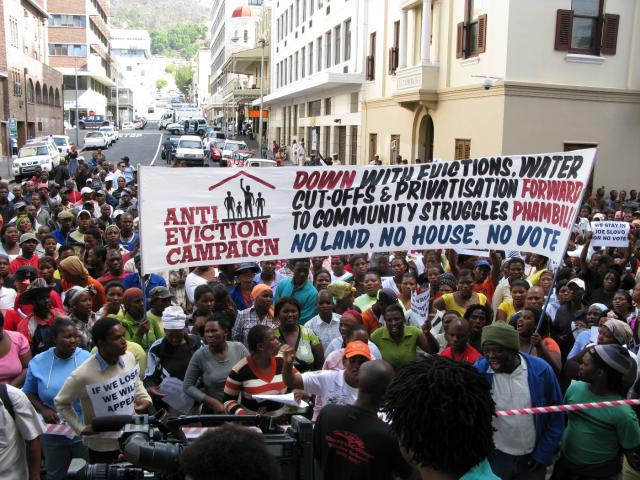
A Report for Abahlali baseMjondolo by Kerry Chance
Monday, March 10 2008, CAPE TOWN - Cape Judge President John Hlophe ordered residents of the Joe Slovo shack settlement to be evicted from their homes in Langa and relocated to Delft, as part of the N2 Gateway Project. Thousands of shack dwellers from Langa, as well as some from Delft, congregated at the steps of the Cape Town High Court to express their opposition to the eviction. They carried signs that read, “If We Lose, We Will Appeal” and “We Will Resist the Red Ants.”
In the packed courtroom, singing could be heard from the remaining crowd outside. Following the decision on Monday, shack dwellers shouted “Phansi Hlophe!” and “Phansi [Housing Minister] Lindiwe Sisulu!” An Anti-Eviction Campaign banner was raised at the front of the crowd that read: “Down with Evictions, Water Cut Offs, & Privatisation, Forward to Community Struggles. Phambili! No Land, No House, No Vote.” Approximately a thousand residents returned to Joe Slovo settlement for a mass meeting to discuss a “resistance Plan B” and the possibility of further legal action in the Bloemfontein Court of Appeal. Residents expressed their solidarity with Delft backyarders, some of whom also attended the meeting.
The Western Cape Anti-Eviction Campaign, in a press release, referred to the decision on Monday as “bureaucratic madness.” Joe Slovo residents “do not want to go” to Delft, but “there are thousands of backyarders in Delft who need the housing being built there,” stated the press release. Currently, Delft backyarders are living on the pavement alongside new, empty houses. Backyarders previously occupied the new houses and were violently ejected from them last month. The houses are now encircled with barbed wire fencing, and patrolled by private security and metro police.
Joe Slovo shack dwellers will not be guaranteed occupancy of new houses in Delft, but rather will be placed in “temporary accommodation,” for an unspecified period of time. Residents already relocated to the Delft “temporary accommodation” found that it was made with cancer-causing asbestos, now a matter of investigation. Complaints also have been lodged that the “accommodation” was defective in a variety of other ways, including huge cracks in the walls and leaking roofs.
The land in Langa, where Joe Slovo shack dwellers have lived for at least nineteen years, will be used for bonded flats, which are too expensive for current residents. Construction of the bonded flats is already underway. Unlike the land in Langa, Delft – dubbed the “Delft Karoo” for its sandy, barren landscape – has no train station, transport costs are high, and it is far from the city centre and Langa, where residents respectively work and children attend school. An estimated 6 000 people will be affected by the eviction order.
In his decision, Judge Hlophe directed Joe Slovo residents to assist in the removal of their homes, and gave authority to the Sheriff to enforce the order. Residents are required to vacate the land in accordance with a timetable, reported the Cape Times, beginning on March 17 and ending on January 19, 2009 – in time for the 2010 Soccer World Cup. In the courtroom, Judge Hlophe cited no reason for the eviction, but directed residents to the fifty page judgment to read his decision in its entirety.
The case against Joe Slovo residents, who were represented in Court by the Legal Resources Centre, was brought by Housing Minister Lindiwe Sisulu, Western Cape Housing MEC Richard Dyantyi and Thubelisha Homes, a company in partnership with government and the manger of the N2 Gateway Project, responsible for building the new houses in Delft and the “temporary accommodation.” Judge Hlophe said in his decision that the company and the government are to file affidavits to the courts every eight weeks to report on the implementation of his eviction and relocation orders.
The Western Cape Anti-Eviction Campaign stated in a press release, “The residents of Joe Slovo wish to make it clear that this is just the beginning of the struggle.”
On the same day that Judge Hlophe handed down his judgment the report of Miloon Kothari, the United Nations Special Rapporteur on Adequate Housing, on his mission to South Africa was released. It is not uninteresting to compare the two documents.

 Stumble It!
Stumble It!